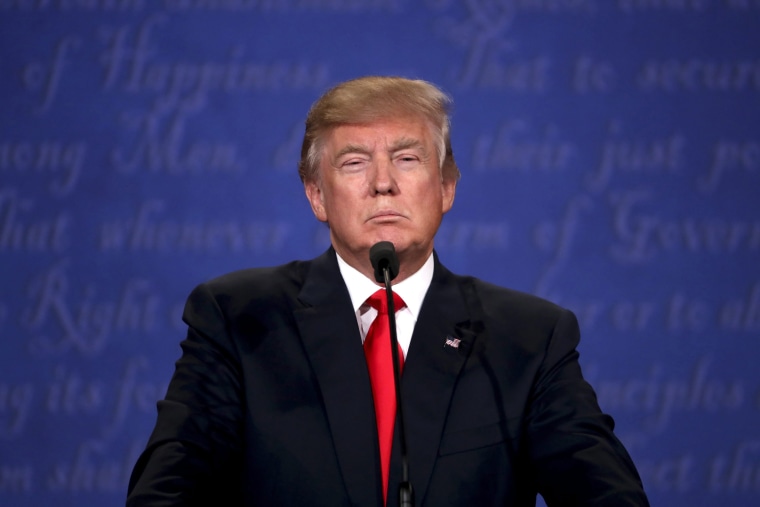LAS VEGAS — November 9th is fast becoming as important as November 8th.
In an election that has already pushed all boundaries of political norms, Donald Trump threatened to break them in Wednesday's debate with his refusal to commit to accepting the outcome of the election, now less than three weeks away.
With that audacious declaration, Hillary Clinton took one step closer to winning Wednesday.
The U.S. tradition of peaceful transfer of power goes back more than two centuries to George Washington's decision to step down after two terms and John Adams conceding a loss to Thomas Jefferson after one. That set the stage for a treasured practice that would endure cries of a "corrupt bargain" from Andrew Jackson supporters in 1824, be renewed at the cost of hundreds of thousands of lives in the Civil War, and finally survive a bitter recount and controversial Supreme Court decision in 2000.
Related: 5 Important Takeaways From the Final Debate
Trump, breaking with his running mate, other Republican leaders, and even his own daughter — not to mention comments he made just weeks earlier in the first debate — said he would "keep you in suspense" about whether he would concede if he loses.
"I will look at it at the time," the GOP nominee told moderator Chris Wallace, drawing swift condemnation even from some other Republicans.
Trump pledged on Thursday to "totally accept" the results of the 2016 election "if I win."
"Ladies and gentlemen, I want to make a major announcement today. I would like to promise and pledge to all of my voters and supporters and to all of the people of the United States that I will totally accept the results of this great and historic presidential election -– if I win."
With one incendiary comment, Trump set the stage for yet another divisive loyalty test inside his own party that will force Republican down-ballot candidates to choose between undercutting their nominee and risking the wrath of his voters or siding with him and further damaging the party brand.
"That’s horrifying," Hillary Clinton responded, before ticking off a long list of contests Trump has claimed were rigged, from the Iowa Caucuses to the Emmy’s. "I should have gotten it," Trump interjected on the TV award.
Trailing badly in polls, Trump did nothing to fundamentally change the dynamic of the race, despite delivering some strong answers on the Supreme Court, guns, and abortion that beleaguered Republicans had hoped to hear. But those discussions were quickly overshadowed by the unusual debate over the fundamentals of American government.
Trump escalated another fight that touched on threats to American elections: He again refused to accept U.S. intelligence agencies’ assessment that the Russian government is attempting to influence the presidential race, leading Clinton to label her opponent "a puppet" of Russian President Vladimir Putin.
"I doubt it," Trump said of Kremlin-backed hacking, even after Wallace confirmed Clinton’s summary of the intelligence agencies’ views. "Our country has no idea."
Trump once again declined to say anything negative about Putin — whom he recently said he would like to meet with even before the inauguration if he wins the presidency — beyond, "This is not my best friend."
Trump's comments came on the heels of Republican Sen. Marco Rubio on Wednesday calling on the GOP nominee to "not indulge" the Kremlin by discussing Wikileaks, which has been posting hacked Clinton campaign emails.
Trump also repeated his call for warmer relations with the Russian leader.
In general, Trump showed more discipline than in previous debates, even as he plugged for his Las Vegas hotel, called Mexican drug cartels "some bad hombres," and called Clinton "such a nasty woman." For long stretches, the conversation actually resembled the kind of exchanges over policy that have typified debates between previous nominees.
But the political point scoring seemed unimportant on a night when a major party nominee raised the possibility of a post-election crisis.
Republican leaders moved quickly to contain the damage of Trump’s talks, with many declaring that he will accept the outcome of the race on Nov. 9.
"He is going to accept the results of the election," RNC chairman Reince Priebus said after the debate.
Asked to explain Trump's refusal to make that same straightforward pledge, Priebus clarified that Trump would accept the results "barring some sort of massive fraud situation."
"Well, I think Donald Trump's gonna be elected president of the United States and I know he'll absolutely accept the outcome of this election," Trump's running mate, Indiana Gov. Mike Pence, told NBC News.
Sen. Jeff Sessions, a top Trump ally, said Trump was merely reserving the right to challenge a close election, comparing it to Al Gore’s legal challenges in 2000.
"He doesn’t intend to be cheated or taken advantage of," he said. "He'll defend his rights."
Gore refused to concede the election to Republican George W. Bush amid a recount in Florida that hung on just a few hundred votes. In this case, what has observers in both parties most concerned is that Trump is preemptively claiming — with virtually no evidence — that the election is "rigged" by a vast and amorphous conspiracy that could already invalidate the results.
Clinton’s campaign meanwhile, watched the development closely. Campaign manager Robby Mook said he "would not be surprised" if Trump refused to concede the race, but insisted he was not worried about the prospect of violence.
"Donald Trump doesn’t get to declare a winner," Mook told reporters. "What’s going to make it legitimate is the vote total."


